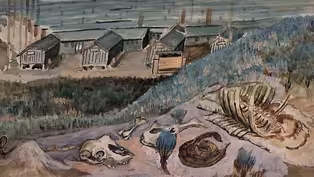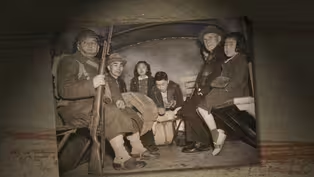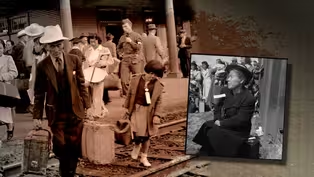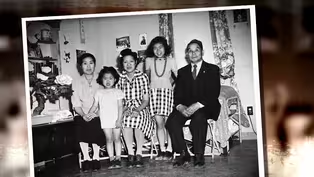Injustice at Home
Shikata ga nai
Season 3 Episode 4 | 6m 4sVideo has Closed Captions
"Shikata ga nai, you can’t help this, you can’t change this, so make the best of it."
The Japanese Americans seldom talked about their incarceration camp experiences...not even to their children. Parents would be telling their kids, "Shikata ga nai, you can’t help this, you can’t change this thing, so make the best of it.”
Problems playing video? | Closed Captioning Feedback
Problems playing video? | Closed Captioning Feedback
Injustice at Home is a local public television program presented by KSPS PBS
Funded by the Kip Tokuda Memorial Washington Civil Liberties Public Education Program, Washington State Office of the Superintendent of Public Instruction. Copyright 2018, Friends of KSPS, Spokane.
Injustice at Home
Shikata ga nai
Season 3 Episode 4 | 6m 4sVideo has Closed Captions
The Japanese Americans seldom talked about their incarceration camp experiences...not even to their children. Parents would be telling their kids, "Shikata ga nai, you can’t help this, you can’t change this thing, so make the best of it.”
Problems playing video? | Closed Captioning Feedback
How to Watch Injustice at Home
Injustice at Home is available to stream on pbs.org and the free PBS App, available on iPhone, Apple TV, Android TV, Android smartphones, Amazon Fire TV, Amazon Fire Tablet, Roku, Samsung Smart TV, and Vizio.
Providing Support for PBS.org
Learn Moreabout PBS online sponsorshipMore from This Collection
A study of the resettlement of Japanese Americans after WWII and the ongoing hardships and discrimination they experienced in the postwar years.
Video has Closed Captions
Takuichi Fujii used art to captured his experiences in Japanese American internment camps. (7m 35s)
We Only Took What We Could Carry
Video has Closed Captions
Japanese living on west coast forced to leave their homes with only what they could carry (8m)
Video has Closed Captions
Japanese Americans lost freedom, possessions, privacy and dignity when forced into camps. (6m 36s)
Video has Closed Captions
Incarceration camps closed, most Japanese Americans were not welcome to return home. (5m 29s)
Providing Support for PBS.org
Learn Moreabout PBS online sponsorship(gentle music) (singing in foreign language) - [Narrator] The Japanese Americans seldom talked about their incarceration camp experiences, not even to their children.
- You know, our parents didn't talk about it.
Maybe it brings back bad memories, or it's just not something they wanna revisit, and so for the longest time, I had, a lot of us had no information.
- The Nesei were very silent about speaking about their experiences in camp.
It was a very dark time of their lives.
They didn't share a lot of that with us, and even that, it was hard for them to express.
- [Narrator] The Japanese Americans tried to make the best of their situation.
- There's this Japanese principle, and it's called Shikata ga nai.
It's a expression that just means it can't be helped.
Parents would be telling their kids, "Shikata ga nai, you can't help this, "you can't change this thing, so make the best of it."
- I think that was the code of the Japanese, you just take it and not say anything.
- They made the best of what was offered.
That no matter what happened, they couldn't do anything about it.
Don't complain.
- [Narrator] But the silence was confusing to their children.
- I remember thinking as a child, "You know there's no pictures of me."
Never realized why until, actually till I was an adult.
Then I heard the stories of why.
- I remember being a little girl and all the adults sitting around the kitchen table talking about camp.
I thought they went to summer camp.
I didn't know at the time, as a little kid, that that was actually a concentration camp.
- [Narrator] For many, the underlying fear that this might happen again never really went away.
- My mom, for example, told me to carry around my birth certificate in my wallet, and I asked her why, and she said, "You never know when you're gonna need it."
(light music) - [Narrator] Every summer, Heart Mountain and Minidoka incarceration camps open their doors to visitors.
Groups of Japanese American families and friends travel there from around the country to share, learn, and remember.
- And most of the people did not want-- - Two years ago, I decided I would visit Heart Mountain, so I went there and I was very struck by the desolation, the crude facilities, and what it must to meant to people at that time, who had come out of homes, come out of jobs, and I was struck by the hopelessness that they must have felt.
- [Narrator] The pilgrimages help create an understanding of the emotional toll the Japanese Americans endured.
- It brings back a lot of memories.
And I can remember, and it, it still hurts, but I'm just real thankful that I'm here.
- Just when I first stepped off the bus today, you know, it just, just sorta sad memories.
And it just breaks your heart to think that something like that could happen.
Yeah.
(somber music) - [Narrator] For many, visiting the incarceration camps was a time for healing and closure.
- I think just way too painful for them to even think about talking about it, you know, until later on, and then realize that they weren't the only ones, you know, that were suffering.
- The impression I got from my mom is that she was bitter about it.
I couldn't really tell you when she really got over it.
Maybe it's when she was willing to talk about it.
- I think to the end he felt let down.
He felt that the United States had betrayed him, and betrayed his family.
And he never had the opportunity that he probably deserved.
- Pilgrimages like this, even though we're looking in the rear-view mirror at what happened in 1942, as we look forward, that we never let people forget what happened during that time.
(gentle music)
Support for PBS provided by:
Injustice at Home is a local public television program presented by KSPS PBS
Funded by the Kip Tokuda Memorial Washington Civil Liberties Public Education Program, Washington State Office of the Superintendent of Public Instruction. Copyright 2018, Friends of KSPS, Spokane.




















